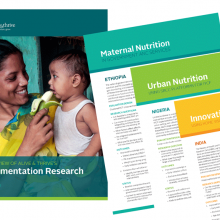Brief, Handout
Oct 28 2020

An overview of Alive & Thrive's implementation research
Alive & Thrive's implementation research spans its program areas, seeking to answer "how" to implement effective interventions and policies. Active studies are detailed in the attached documents.
Journal article
Oct 08 2020

Trends and inequalities in the nutritional status of adolescent girls and adult women in sub-Saharan Africa since 2000: a cross-sectional series study (BMJ Global Health, 2020)
Journal article
Jul 16 2020

Early breastfeeding practices contribute to exclusive breastfeeding in Bangladesh, Vietnam, and Ethiopia (Nguyen, P.H., 2020. Maternal & Child Nutrition)
Data from three impact evaluations of large-scale social and behavior change communication (SBCC) interventions in Bangladesh, Vietnam and Ethiopia were used to examine whether early initiation of breastfeeding (EIBF) and non-prelacteal feeding are associated with increased prevalence of exclusiv
Journal article
Jul 16 2020

Infant and young child feeding (IYCF) practices in Ethiopia and Zambia and their association with child nutrition: analysis of demographic and health survey data
Data from the 2005 Ethiopia Demographic and Health Survey (EDHS) and the 2007 Zambia Demographic Health Survey (ZDHS) were analyzed to examine the association between recommended IYCF indicators and nutritional status among children 0-23 months of age in Ethiopia and Zambia.
Journal article
Jul 16 2020

Assessing implementation fidelity of a community-based infant and young child feeding intervention in Ethiopia identifies delivery challenges that limit reach to communities: a mixed-method process evaluation study (Kim, S., 2015. BMC Public Health)
Analysis of program fidelity, defined by adherence to intervention design, exposure, quality of delivery, and participant responsiveness, was examined in an IYCF program in Ethiopia.
Journal article
Jul 16 2020

Predictors of exclusive breastfeeding and consumption of soft, semi-solid or solid food among infants in Boucle du Mouhoun, Burkina Faso: A cross-sectional survey (Cresswell, J., 2017. PLOS ONE)
Many mothers have low levels of knowledge regarding breastfeeding and demonstrate poor practices, according to this cross-sectional survey (n = 2288) of a representative sample of women aged 15–49 years with at least one live birth in the past year conducted during June and July 2015 in the Boucl

